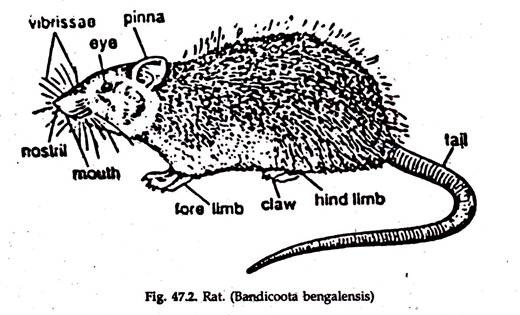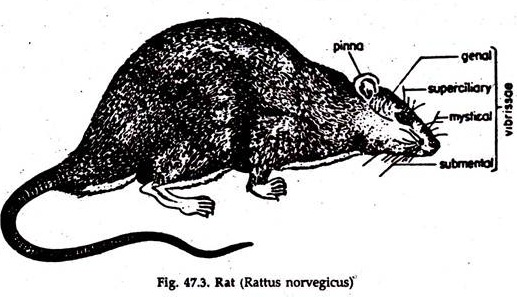In this article we will discuss about:- 1. Behaviour, Ecology and Control of Mammalian Grain Pest 2. Management of Mammalian Grain Pest.
Behaviour, Ecology and Control of Mammalian Grain Pest:
The major field and stored grain mammalian pests are Bandicoota bengalensis (Fig. 47.2) and rattus norvegicus. The Bandicoot rat is commonly known as Indian mole rat and R. norvegicus (Fig. 47.3) as field rat and rural rat.
1. They are widely distributed in the Indian subcontinent, South-east Asia and other countries.
ADVERTISEMENTS:
2. A mature Bevndicoota weighs about 200 gms and lives for nearly 200 days.
3. They are good climbers and swimmers.
4. They inhabit fields, grasslands and houses. These fossorial and nocturnal animals are most active immediately after dusk.
ADVERTISEMENTS:
5. They burrow in soil. The burrow extends to a depth of 1.0 to 1.5 m and ramifies laterally up to 12 m. From a central chamber, lateral canals extend to open outside by separate openings.
6. The rats store grain inside the burrow and a single burrow may have 5 to 6 kgs of grain.
7. Usually they prefer wheat and paddy. Each rat consumes 11 to 12 gms of grain daily and spoils at least 3 times of it with urine and faeces.
8. The males mature at about 58 days while females require 90 to 100 days.
ADVERTISEMENTS:
9. They reproduce throughout the year and all the life.
10. The gestation period is 23 days. 5 to 14 offspring’s are born in a litter.
Management of Mammalian Grain Pest:
1. Physical:
a. Protectors:
The rats usually live outside near the house. At night they enter the store or dwelling house through doors, windows, holes and drains. Regular maintenance of sanitation, blocking of holes, closing doors, etc. may prevent their entrance.
b. Traps:
Various traps are in use. The most effective is box traps of 30 x 17.5 x 12.5 cm size. Baits with attractant are put in the traps and set in the place haunted by rats. The rat enters the box for food and is trapped.
2. Chemical:
a. A single dose of rodenticide like Strychnine, Zinc phosphide, Calcium arsenate, etc. is mixed with favourite food of rat and left. One bite on the bait is enough to kill a rat.
ADVERTISEMENTS:
b. Several applications of Pivol, Fumerin, Rozol etc. kill rats. These are used as fumigants or with baits.

